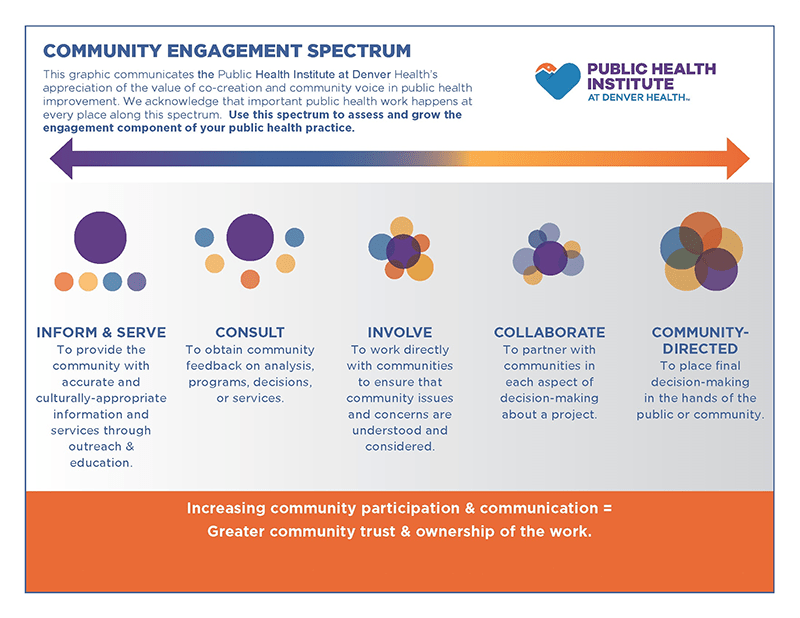The Public Health Institute at Denver Health (PHIDH) commits to being anti-racist and promoting policies and principles that advance health and racial equity. We aim to position ourselves in the fight to end systemic racism and we acknowledge that becoming anti-racist is not a static achievement. It is lifelong work that we must commit to every day. While the main focus of this work is on being anti-racist, we acknowledge that many individuals experience life through more than one lens at the same time and this intersectionality can compound the impacts of injustices on health outcomes and will be incorporated when creating policies, practices, and systems. This framework describes the racial equity plan for PHIDH.
1. Organizational Commitment to Change:
As Public Health Practitioners, Researchers and Leaders, we must acknowledge that racism is, and has always been, a public health emergency that we must work to end. Communities of Black, Indigenous and People of Color (BIPOC) experience greater institutional, structural, and systemic inequalities that lead to worse health outcomes. This is a direct result of racism in our country. As PHIDH, we must ensure that racial equity exists at the core of all initiatives and work to end adverse health outcomes for communities most impacted by racism. PHIDH acknowledges previous inaction and the need for introspection regarding our own complicit role in contributing to and upholding structural racism. Establishing anti-racist organizational values requires honesty, reflection, and refinement of current practices, the interests they serve, and the people and perspectives they exclude.
2. Anti-Racist Policies, Practices & Systems:
PHIDH recognizes that creating and implementing anti-racist policies leads to adoption of anti-racist practices and an organizational culture that promotes inclusivity and belonging. To achieve this, PHIDH aims to create and sustain inclusive organizational cultures that support and uphold anti-racism in all policies and practices. PHIDH will ensure data is collected, interpreted, and shared in ways that promote health and racial equity, and will strive to recruit, hire, retain, and promote a diverse workforce that is representative of the communities that we serve.
3. Community Activation and Empowerment:
PHIDH acknowledges that we are not the experts in racial equity and anti-racism and that partnering with community organizations leading this work, as well as those most impacted by racism, is central to our success. Beyond inclusion, we commit to promoting belonging, and believe that all should have a say and a hand in co-creating that to which they are belonging. It is essential to cultivate and invest in partnerships with affected communities, ensure active inclusion of BIPOC voices, and develop shared power in public health.
4. Measurement, Evaluation, Learning. & Reporting:
PHIDH will identify clear goals (short, mid, and long term) and objectives focused on health and racial equity. We will establish accountability structures, data collection methods, and reporting mechanisms to embed health and racial equity throughout our work. We commit to advocating for changes in how data is collected and shared across the enterprise, using numbers and narratives to drive policy, programming, and funding decisions. We support a culture of data that collects, monitors, analyzes, and shares data on health outcomes and behaviors to assess disparities and advance health and racial equity. Data should be multiculturally valid and oriented toward participant ownership. Goals and objectives, accountability structures and reporting mechanisms will assist PHIDH staff in continual learning and growth in our understanding of racial equity.


